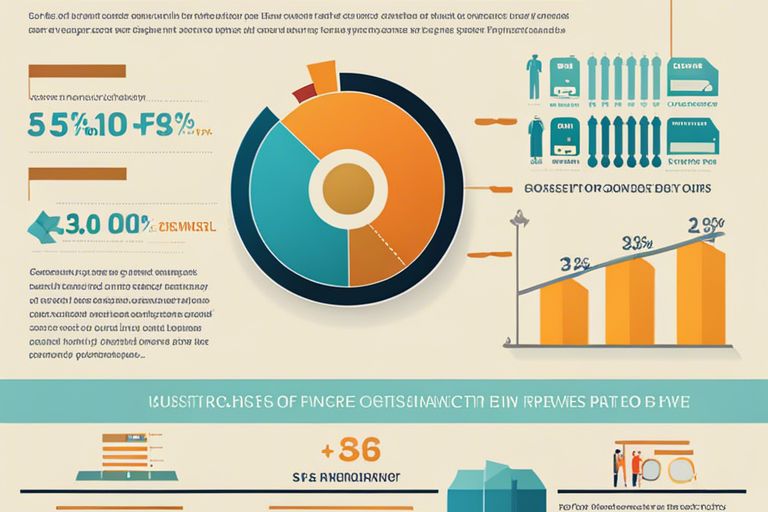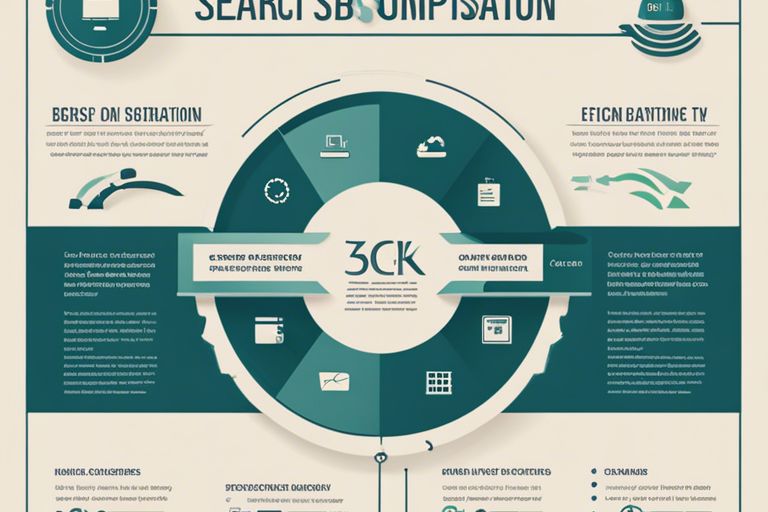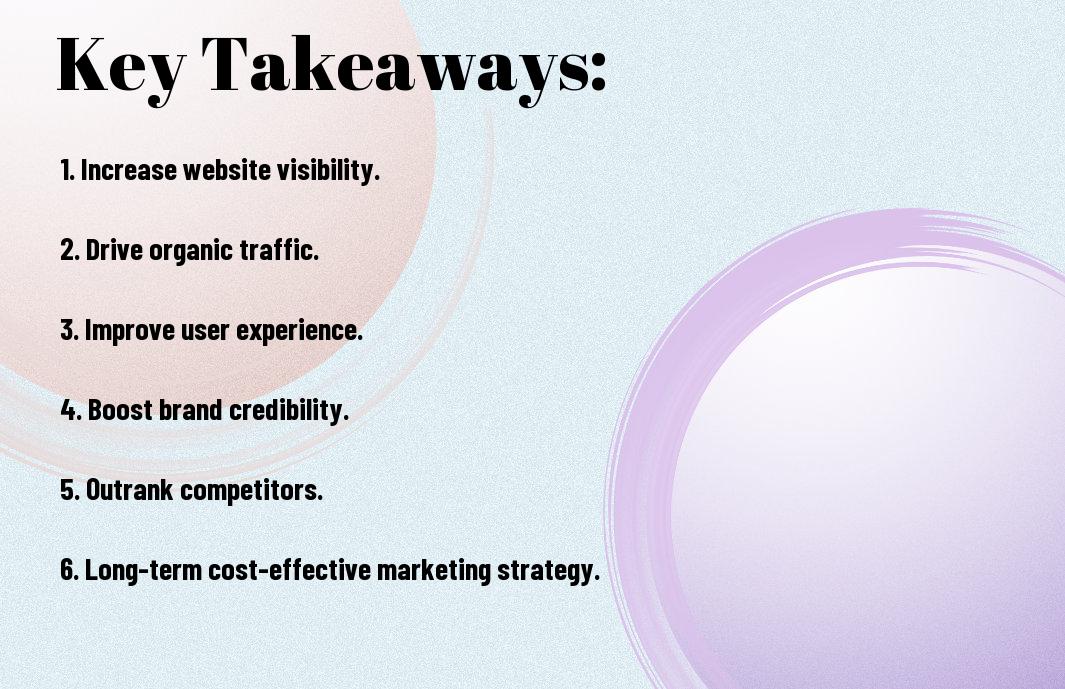You may be wondering, what exactly is the benefit of search engine optimization (SEO) for your website? Well, let me shed some light on this necessary digital marketing strategy. SEO improves your website’s visibility on search engines like Google, driving organic traffic and increasing your chances of being found by potential customers. By optimizing your website’s content and structure, you can increase your website’s ranking on search engine results pages, leading to higher click-through rates and ultimately, more sales. But that’s not all – SEO also helps build credibility and trust with your audience, establishing your brand as a leader in your industry. So, if you want to reach your target audience effectively and stand out from the competition, investing in SEO is a wise choice.
Key Takeaways:
- Increased visibility: Search engine optimization (SEO) helps improve your website’s visibility on search engines, making it easier for your target audience to find you online.
- Drive organic traffic: By optimizing your website with SEO, you can attract more organic traffic, which means users who are actively looking for products or services like yours are more likely to visit your site.
- Build credibility and trust: Ranking higher on search engine results pages can build credibility and trust with your audience, as users tend to trust websites that appear at the top of search results.
Core Benefits of SEO
Improved Visibility and Ranking
If you want your website to appear at the top of search engine results pages (SERPs), then Search Engine Optimization (SEO) is imperative. With strategic SEO techniques, you can improve your website’s visibility online and increase its chances of ranking higher on search engines like Google. This increased visibility can lead to more organic traffic and brand exposure.
Increased Organic Traffic
Improved SEO can significantly boost the organic traffic to your website. By optimizing your website’s content, meta tags, and keywords, you can attract more visitors who are actively searching for products or services related to your business. Visibility on the first page of search results can lead to a higher click-through rate (CTR) and ultimately more conversions.

Business and Marketing Impacts
Cost-Effectiveness Compared to Paid Advertising
Assuming proper implementation, search engine optimization can provide significant cost-effectiveness compared to paid advertising. By optimizing your website to rank higher in search results, you can attract organic traffic without having to pay for each click. This long-term strategy can result in a higher return on investment over time.
| SEO | Paid Advertising |
| Long-term results | Immediate results |
| Lower cost per acquisition | Higher cost per click |
Enhancement of User Experience and Credibility
On top of improving your search engine rankings, SEO can also enhance the user experience of your website and establish credibility with your audience. By optimizing your site’s content, speed, and mobile responsiveness, you can create a positive user experience that keeps visitors engaged and encourages them to explore further.
Credibility plays a crucial role in the success of a business. When your website ranks high on search engine results pages, users are more likely to trust your brand. This trust can lead to increased traffic, conversions, and ultimately, revenue. By consistently providing valuable content and a seamless user experience, you can build a strong reputation in your industry.
CostEffectiveness The cost-effectiveness of SEO lies in its ability to drive organic traffic to your website without continually paying for each visitor. By investing in optimizing your site for search engines, you can attract quality leads and customers over time, resulting in a sustainable marketing strategy for your business.
Technical Advantages of SEO
Website Optimization and Performance
Now, an necessary technical advantage of SEO is website optimization and performance. A well-optimized website not only ranks higher in search engine results but also provides a better user experience. By improving page loading speed, fixing broken links, and optimizing images and content, you can enhance site performance and increase user engagement.
Mobile Optimization and Local SEO
Technical advancements in SEO also include mobile optimization and local SEO. The increasing use of mobile devices for browsing makes it crucial for websites to be optimized for mobile. Local SEO focuses on optimizing a website to appear in local search results, especially important for businesses that serve a specific geographical area.
Plus, mobile optimization ensures that your website is responsive and easily accessible on various devices, improving user experience and increasing the chances of conversions. Local SEO, on the other hand, helps businesses attract local customers by targeting specific geographic locations and optimizing their online presence for local searches. Implementing these technical aspects of SEO can significantly boost the visibility and performance of your website.
Strategic Benefits
Not leveraging search engine optimization (SEO) can lead to missed opportunities for your business. According to 15 SEO Benefits You Need to Know in 2024, the strategic benefits of SEO are crucial for staying competitive in the digital landscape.
Long-Term Growth and Scalability
With a solid SEO strategy in place, your website can experience long-term growth and scalability. By optimizing your site for search engines, you can attract more organic traffic over time, leading to increased visibility and potential sales. This sustainability factor is necessary for businesses looking to establish a strong online presence and expand their reach.
Insight into Customer Behavior and Market Trends
On top of enhancing your website’s visibility, SEO provides valuable insights into customer behavior and market trends. By analyzing keyword data and search patterns, businesses can better understand what their target audience is searching for online. This information allows companies to tailor their marketing strategies and product offerings to meet consumer demands effectively.
Benefits of gaining insight into customer behavior and market trends through SEO include the ability to make informed decisions, stay ahead of the competition, and build a loyal customer base. By leveraging these insights, businesses can create targeted campaigns that resonate with their audience and drive sustainable growth in the long run.
Challenges and Considerations
Understanding Algorithm Changes
Unlike other marketing strategies, search engine optimization is heavily reliant on search engine algorithms, which are constantly evolving. Any changes in algorithms can significantly impact a website’s ranking, making it crucial for SEO professionals to stay updated with the latest trends and adapt their strategies accordingly. Algorithm updates can pose challenges in maintaining visibility and rankings, requiring continuous monitoring and adjustments to stay competitive in the ever-changing digital landscape.
Balancing SEO with other Marketing Efforts
The key challenge in SEO is striking the right balance with other marketing efforts to ensure a cohesive and effective overall strategy. The integration of SEO with other marketing channels such as social media, content marketing, and paid advertising requires a nuanced approach to maximize results. It’s necessary to consider the synergies between SEO and other tactics to create a holistic marketing plan that leverages the strengths of each channel while minimizing potential conflicts or redundancies.


Conclusion
Hence, the benefit of search engine optimization lies in its ability to enhance the visibility of a website, attract more organic traffic, and ultimately improve a website’s ranking on search engine results pages. By optimizing the website’s content and structure to align with search engine algorithms, businesses can effectively reach their target audience and increase their online presence. Investing in SEO not only boosts a website’s visibility but also establishes credibility and trust with users, leading to long-term success and improved return on investment.
FAQ
Q: What is search engine optimization (SEO)?
A: Search engine optimization (SEO) is the practice of optimizing your website to improve its visibility on search engine results pages (SERPs) for relevant keywords and phrases. This involves making changes to your website’s content, structure, and other factors to help search engines better understand your site’s relevance to users’ search queries.
Q: Why is search engine optimization important for businesses?
A: Search engine optimization is important for businesses because it helps drive organic traffic to their websites, increases visibility and brand awareness, and allows them to reach their target audience more effectively. By ranking higher in search engine results, businesses can attract more qualified leads and ultimately increase their sales and revenue.
How can search engine optimization benefit a website in the long run?
A: Search engine optimization can benefit a website in the long run by providing sustainable results that continue to drive traffic and leads over time. By consistently improving and maintaining SEO efforts, a website can establish itself as a reliable and authoritative source in its industry, build trust with users, and stay ahead of competitors in search engine rankings.



